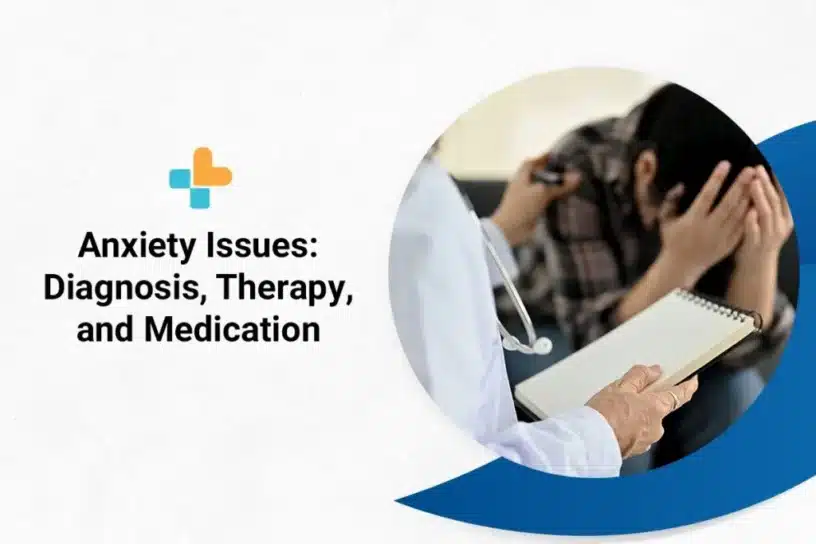Indian society regards discussing mental health as a taboo subject. Many victims either don’t acknowledge they need help or are shunned away when they seek one. And while severe mental health issues, such as schizophrenia, are addressed and treated, more common mental health issues, such as depression and anxiety disorders, are unfortunately overlooked.
In 2017, an estimation of mental health conditions across India revealed that as many as 197.3 million people required treatment for mental health conditions. This included around 45.7 million people with depressive disorders and 44.9 million people with anxiety issues.
The following article delves into the severity of anxiety issues, symptoms to look out for, and the role of therapy and medication in helping anxiety disorder.
What Is Anxiety Disorder?
Anxiety disorders are mental health conditions characterized by excessive nervousness, persistent fear, apprehension, and terror that peaks within minutes (panic attack) to the degree it affects the normal functioning of an individual. These often come in repetitive episodes and alter a person’s behaviour and ability to process emotions.
Experiencing occasional anxiety is a part of normal life and is often considered a healthy emotion.
However, a person having constant, intense, and excessively overwhelming worry or fear about everyday situations is viewed as a disproportionate level of anxiety.
Common Types of Anxiety Disorder
Anxiety disorder often makes it difficult to get through the day. An individual can have more than one type of anxiety disorder. There are six major types of anxiety disorder. These are:
- Generalized anxiety disorder (GAD): This is characterized by chronic anxiety, excessive worrying, and tension.
- Panic disorder: In this condition, one experiences recurring panic attacks at unexpected times.
- Social anxiety disorder (social phobia): This is caused by extreme fear of being judged by others in social situations.
- Obsessive-compulsive disorder (OCD): It is characterized by recurrent irrational thoughts leading to repetitive behaviours.
- Post-traumatic stress disorder (PTSD): Anxiety that follows a traumatic event.
- Separation anxiety disorder: A fear of being away from home or your loved ones.
Symptoms of Anxiety Disorder
Experiencing trauma or an extended period of long stressful situations may contribute to anxiety issues. Likewise, anxiety can also result from underlying medical conditions or surface in case of withdrawal from drugs. In all cases, the following are common symptoms of anxiety disorder:
- Having a sense of impending danger, panic or doom
- Feeling restless and avoiding socializing
- Rapid heartbeat or palpitations
- Breathlessness or suffocation
- Sweating, trembling, and fatigue
- Nausea, diarrhoea, and other GI problems
- Insomnia
- Muscle tension or headaches
- Feeling on edge or excessive over-thinking
- Difficulty concentrating or remembering things
- Recurrent and intrusive thoughts
- Compulsive behaviours or rituals (OCD)
Diagnosis of Anxiety Disorder
The diagnosis of anxiety disorders typically involves a comprehensive evaluation by a mental health professional, such as a psychiatrist or a psychologist. The following steps will be part of the evaluation:
- Medical history: The doctor will ask about any previously diagnosed physical or mental health conditions, existing medications, and substance use.
- Symptom assessment: The mental health professional will ask you to describe your symptoms, including their duration, their severity, and how they affect your daily life.
- Psychological evaluation: The doctor will ask you to complete psychological questionnaires or take standardized tests to assess your symptoms and identify the type of anxiety disorder.
- Physical examination: A physical examination may be necessary to rule out any underlying medical conditions that may be contributing to your symptoms.
- Diagnostic criteria: The mental health professional will use diagnostic criteria outlined in the Diagnostic and Statistical Manual of Mental Disorders (DSM-5) for a thorough analysis of anxiety disorder.
Treatment for Anxiety Issues
It’s important to be honest and open with mental health professionals about the symptoms and keep them informed of any changes or concerns.
With appropriate treatment and support, an individual with anxiety issues can manage the symptoms and lead an active and fulfilling life.
The two lines of treatment that go hand in hand in treating symptoms of anxiety are medication and therapy.
Role of Medication in Treating Anxiety Issues
Medication is useful for alleviating the symptoms of anxiety and is usually prescribed in conjunction with other therapies.
Antianxiety or antidepressant medications are usually prescribed to help subside anxiety’s effect on the body. These medications effectively alter your brain chemistry to improve mood and reduce stress. It’s important to keep in mind that medication is not a cure for anxiety disorders but rather a tool to help manage symptoms.
There are several medications that help treat anxiety disorder. These include the following:
- Selective serotonin reuptake inhibitors (SSRIs): Escitalopram, fluoxetine, and paroxetine are common SSRIs or antidepressant medications.
- Beta-blockers: Propranolol is a beta-blocker that helps in mild cases of anxiety.
- Serotonin and norepinephrine reuptake inhibitors (SNRIs): Duloxetine and venlafaxine are common SNRIs which act on brain chemicals to alleviate anxiety.
- Antipsychotics: Quetiapine and aripiprazole are common antipsychotics.
- Benzodiazepines: Diazepam and clonazepam are common benzodiazepines. But these are only prescribed in severe cases of anxiety as they are heavily addictive.
- Anxiolytics: Buspirone is a common anxiolytic which is comparatively safer than benzodiazepines and helps in relieving symptoms of anxiety.
Role of Therapy in Treating Anxiety Issues
Therapy plays an important role in treating anxiety disorders. Psychotherapy is often the first line of treatment for these conditions and can be very effective on its own or in combination with medication.
Psychotherapy, or counselling, helps an individual address the issue and deal with the emotional response to anxiety.
A mental health professional talks through strategies to help you better understand and manage anxiety disorder. Here are some common approaches.
1. Cognitive-Behavioral Therapy (CBT)
Therapies such as cognitive-behavioural therapy (CBT) can help you identify and challenge negative thought patterns that contribute to your anxiety and replace them with more balanced, realistic thoughts.
2. Exposure Therapy
This therapy helps you face and overcome your fears. This type of therapy involves gradually exposing yourself to the objects or situations that trigger your anxiety in a controlled, safe environment to reduce your anxiety over time.
3. Acceptance and Commitment Therapy (ACT)
ACT takes a different approach than CBT to address negative thought patterns in anxiety. It uses strategies such as mindfulness, progressive muscle relaxation, and goal setting to reduce discomfort and manage symptoms of anxiety at the very moment.
4. Addressing Co-Occurring Conditions
If you have an anxiety disorder and a co-occurring condition, such as depression, therapy can help you address both conditions simultaneously and develop a comprehensive treatment plan.
How To Manage Anxiety Issues
To manage an anxiety disorder, its evolution must be understood, accepted, and addressed at the right time.
There is no exact factor that can contribute to any mental illness; it’s always a combination of genetics and circumstances that exert abnormal pressure on the brain to alter it. In other words, they aren’t a result of weakness, character flaws, or upbringing issues.
People with anxiety disorder can take several steps that can improve their quality of life.
Making changes to one’s daily routine can help reduce anxiety symptoms. This can include regular exercise, a balanced diet, good sleep habits, and stress management. Alternatively, herbal supplements, acupuncture, or massage may also help subside anxiety’s effect on the body.
One can also join support groups and exchange strategies for helping anxiety issues. Talking to peers and family and educating them about the condition may also be useful in coping with the condition.
The Outlook for People With Anxiety Issues
It’s important to remember that recovery from an anxiety disorder takes time, and it’s normal to have ups and downs along the way. You don’t need to live in constant fear or worry.
A mental health professional can help you create a personalized treatment plan that takes into account your individual needs and circumstances and provides support and guidance throughout the recovery process.
At Ayu Health, we’re committed to providing the best mental health professionals and resources to help individuals affected by mental health conditions, including anxiety disorder.
If you need additional information or would like to speak with a professional, feel free to contact us right away at +91 636-610-0800 or book an appointment on our website.
Our Hospital Locations
General Surgery Hospitals in Chandigarh | General Surgery Hospitals in Bangalore | General Surgery Hospitals in Jaipur | General Surgery Hospitals in NCR | General Surgery Hospitals in Hyderabad
Our Doctors
General Surgery Doctors in Chandigarh | General Surgery Doctors in Bangalore | General Surgery Doctors in Jaipur | General Surgery Doctors in NCR | General Surgery Doctors in Hyderabad
About the Author

Dr. S. Goel
Dr. S. Goel is a renowned Internal Medicine Specialist currently practicing at Ayu Health, Bangalore. He is a Specialist in Internal Medicine, Diabetes HTN, Paediatric Care, and Family Medicine.




